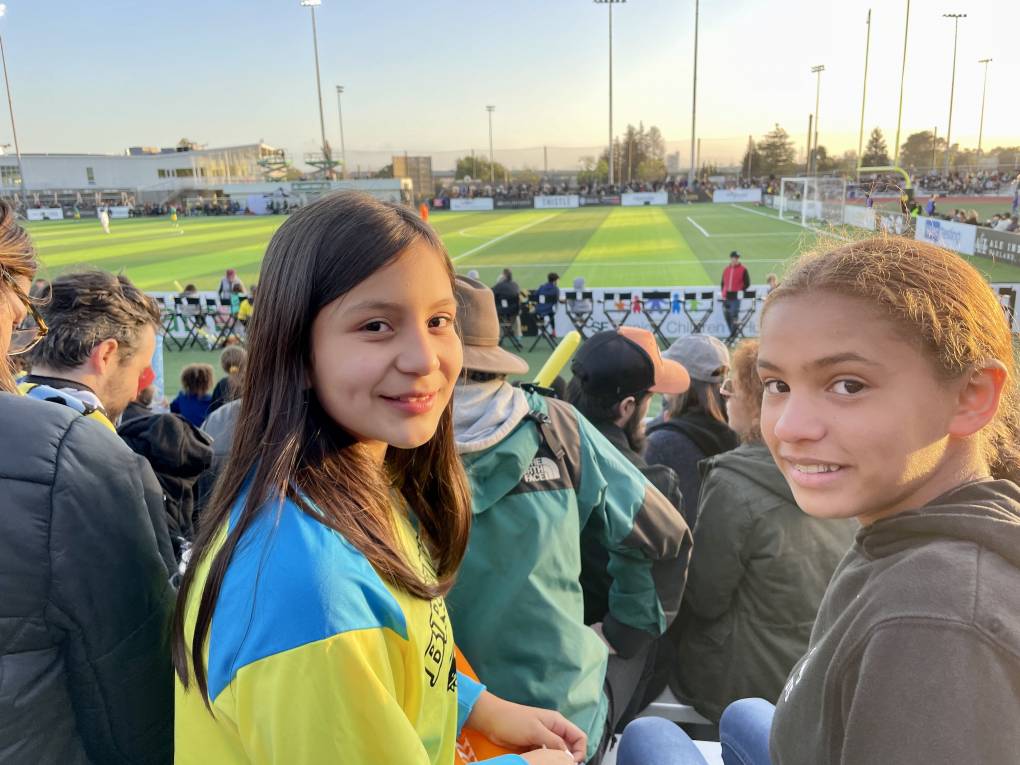
Now, as a number of high-profile professional sports teams have recently left Oakland (or are threatening to do so), the Roots club is expanding, and — like the group organizing to bring a WNBA team to the Oakland Arena — it’s placing its money on a women’s team. The club recently announced the launch of Oakland Soul, a women’s amateur summer soccer team that’s slated to begin playing at Merritt College in the Oakland hills in the spring of 2023.
At a recent Roots game, members of Edna Brewer Middle School’s girls’ soccer team, who were being honored for winning the Oakland Athletic League championship, were thrilled to hear the news.
“For real?! No way. Oh my god! There’s really going to be one?!” shouted 11-year-old goalie Rachel Sanchez, as she sat with her teammates in the bleachers, watching the Roots’ offense move the ball up the field.
“It has a really awesome connection to Roots,” said Jenna Lamb, Oakland Soul’s business development director, on the new team’s name. “They’re both intangible, things that you can’t see. And obviously, Oakland has an incredible amount of soul in the culture, the arts and the people here.”
‘Build the pipeline’
The team is now beginning the process of recruiting and selecting players.
“A good chunk of the roster will come from universities,” Lamb said, noting that the team’s preprofessional, amateur status means it will focus on developing the skills of advanced college players. “We’re really lucky that, in the Bay Area, there are so many incredible top-tier universities in women’s soccer super close.”
But that also means players on the team won’t receive any compensation. That’s typical for amateur teams, but for some fans of the Oakland Roots, whose players are compensated, having an unpaid women’s team is a point of contention — particularly in the wake of the recent high-profile fight waged by the USA women’s soccer team for pay equity.
“I don’t think that’s a message that we want to send to our young athletes,” said Reanna Couts, head coach of the Edna Brewer girls’ team. “We want to send the message that they are just as important, just as talented, and deserve the same compensation as men.”
Lamb, however, points out that players on Project 510, the men’s preprofessional team — Oakland Soul’s counterpart — are also unpaid. The decision to not yet create a professional women’s team in Oakland, she adds, boils down to the lack of available facilities.
“I think as anybody in the Bay Area is aware, land is hard to come by,” she said, noting that only two fields in Oakland — the Oakland Coliseum and the field at Laney College — meet professional soccer standards.
The Coliseum would be far too expensive, Lamb says, and the Laney field doesn’t have the capacity to host another professional team.
“It would be sacrificing the quality of both teams to try and squeeze another professional organization in there,” she said. “There just isn’t room.”
Lamb says that with a few changes, like more bleacher seating and lights, Merritt College’s field could be developed to meet professional standards, assuming the college was on board.
In the meantime, she says, the club didn’t want resource limitations to keep female players off the field. “Starting a development team now allows us to get into the community and allows us to build the pipeline,” she said.
Business and activism
Oakland Roots club president Lindsay Barenz, who took the helm in January, is hopeful Oakland Soul could someday go pro if enough people show up to games and make it worth the investment to build a new facility.
The Roots club was founded in 2018 with the “purpose of using soccer to create positive social change,” Barenz said, noting that adding a women’s team has long been a goal.
Women’s soccer, she says, has taken off in the U.S. ever since the national women’s team won the World Cup in 2019.
“It finally became apparent to the owners of capital that [women’s soccer] was a worthwhile investment — not [just] an opportunity to make a contribution to the social good,” said Barenz, “but an opportunity to make money.”
Now, she says, there are more opportunities than ever before to build new professional women’s soccer teams. But even so, both Barenz and Lamb say they want to be careful how they proceed.
“There’s this very storied history of women’s teams, women’s leagues in the United States, collapsing because of growing too quickly or mismanagement,” said Lamb.
That has played out here in the Bay Area. The last two professional women’s teams — the San Jose CyberRays and FC Gold Pride — both folded after just three years.
‘The full spectrum’
Those teams took with them the social benefit of having professional female athletes be local role models, Barenz notes.
“You can’t be it if you can’t see it,” she said. “We have to make young people realize that there’s a wide range of opportunities for participating in sports. Young boys have always seen the full spectrum,” from weekend recreational league opportunities to professional teams.
“For a long time, we’ve only shown women and girls a part of that spectrum,” she said.
This year marks the 50th anniversary of Title IX, the landmark national law that expanded sports opportunities for women by requiring all federally funded schools to provide their students equal access to athletics, regardless of gender. The law is currently undergoing changes that would expand these protections to transgender athletes, in an effort to counter a series of new state laws that ban their participation in sports that match their gender.
In the half century since the law’s passage, participation in women’s high school and college sports has multiplied tenfold. That rate, though, still pales in comparison to involvement in men’s sports, according to the National Federation of State High School Associations and the NCAA.
This news is republished from another source. You can check the original article here


